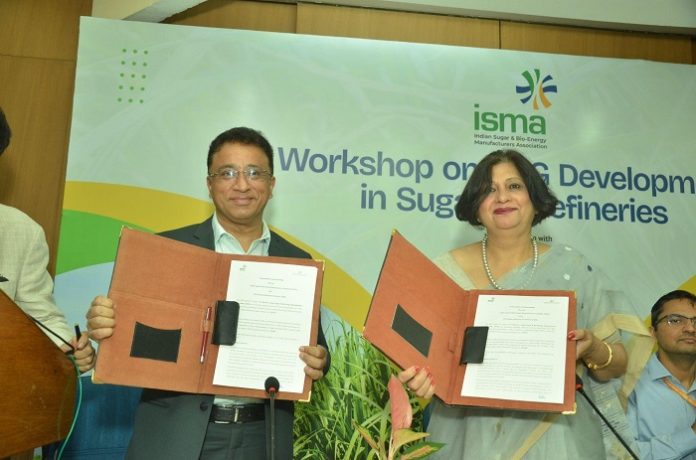The Indian Sugar & Bio Energy Manufacturers Association (ISMA) entered into A Memoranda of Understanding (MOUs) with The Energy and Resources Institute (TERI) and PRAJ Industries to promote sustainable bioenergy solutions, including Sustainable Aviation Fuel (SAF), Bio-Ethanol, Bio-Gas, Green Bio-Hydrogen, and green methanol.
The collaboration is aimed at strengthening India’s bio-economy and low-carbon energy infrastructure, emphasizing knowledge exchange, policy development, and capacity building between the industry and government.
The partnership sets the stage for advancing SAF production and deployment, aligning with India’s sustainability targets. As the aviation industry’s carbon footprint continues to grow, ISMA’s initiatives will bolster the country’s commitment to bioenergy adoption, specifically meeting the goal of blending one percent SAF with aviation turbine fuel by 2027 and 5% by 2030, as mandated under the CORSIA framework of the International Civil Aviation Organization (ICAO). CORSIA’s second voluntary pilot phase is currently underway (2024-2026), with full implementation scheduled for 2027.
Deepak Ballani, Director General of ISMA said, “The collaboration marks a significant milestone in our mission to promote sustainable energy solutions in aviation. The MOUs with TERI and PRAJ Industries not only represent a collaboration but also reflect our commitment to a greener future. Unlike conventional jet fuels, SAF derived from renewable resources offers a substantial reduction in greenhouse gas emissions, which is one of the aviation sector’s major challenges. With TERI’s research expertise and PRAJ’s technological solutions, we are poised to overcome these challenges and foster a thriving bioenergy ecosystem”.
Ballani further emphasized ISMA’s dedication to spearheading initiatives that drive collaboration, capacity building, and knowledge sharing to support sustainable growth in both agriculture and bioenergy sectors. “Together, we are positioning India as a global leader in bioenergy production, addressing both environmental and economic needs,” he added.
Aviation currently contributes around three percent of global carbon emissions, with nearly 1 billion metric tonnes released annually. As the sector’s carbon footprint grows, the demand for alternatives to traditional jet fuel becomes increasingly urgent.
One promising feedstock for SAF production is bagasse, a byproduct of the sugarcane industry. Abundant in availability and technologically feasible for SAF production, bagasse offers a cost-effective and environmentally friendly solution to reduce greenhouse gas emissions.
As per the press release, ISMA’s collaboration with TERI and PRAJ Industries underscores its ongoing efforts to help India achieve its bioenergy and sustainability objectives, leveraging the strengths of the sugarcane industry to make significant strides in green energy solutions.































